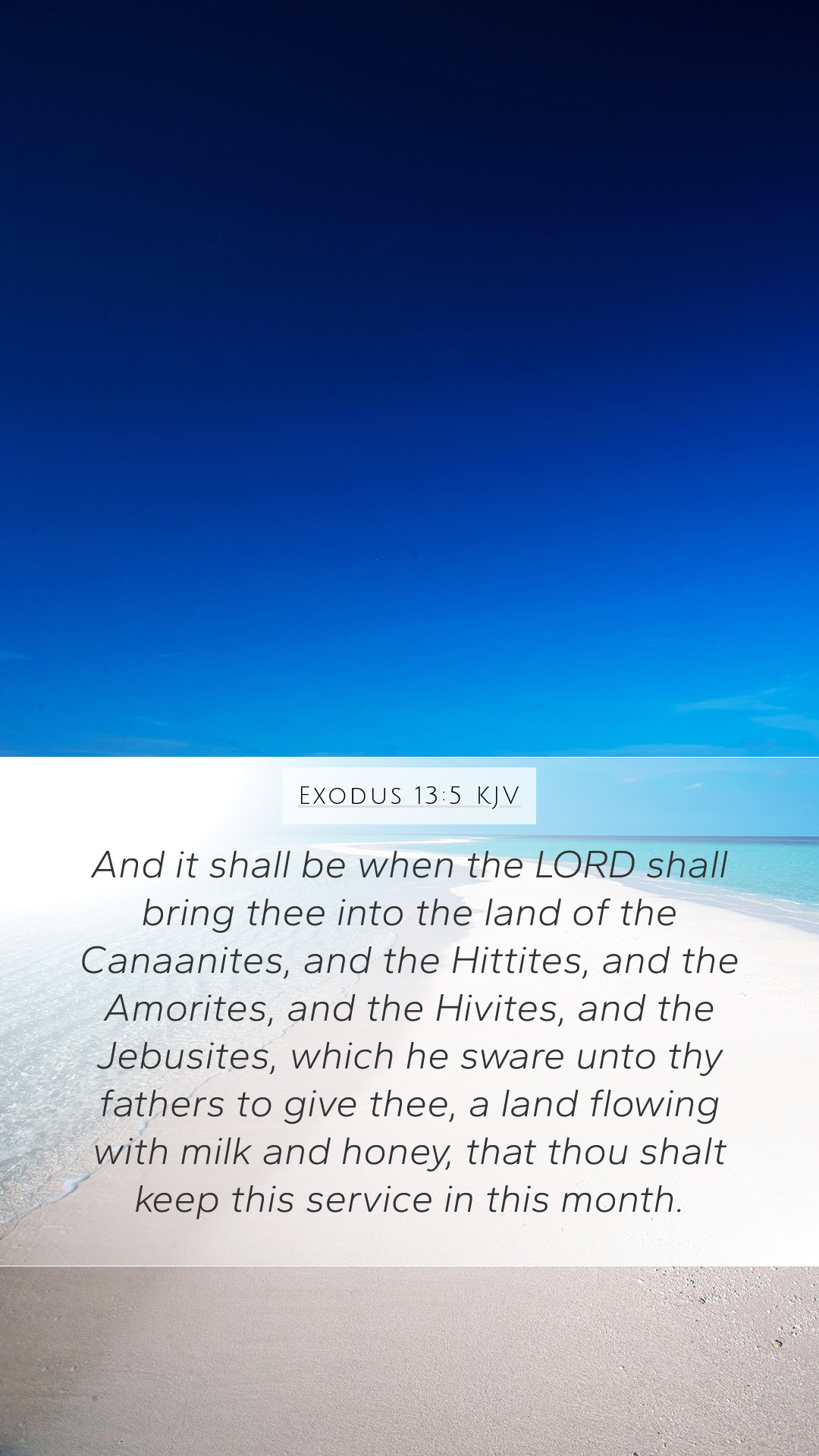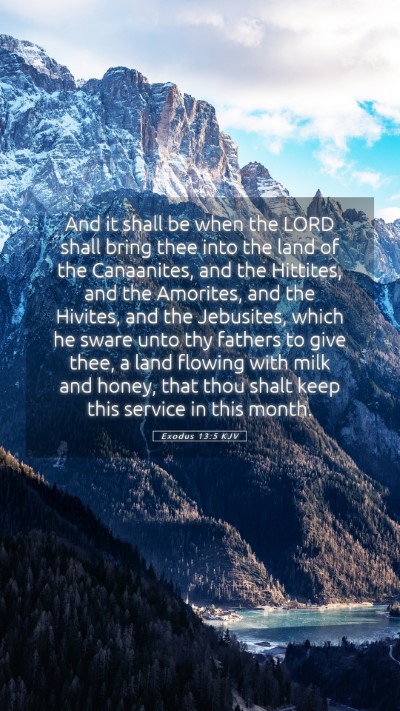Understanding Exodus 13:5: A Comprehensive Commentary
Exodus 13:5 states, "And it shall be, when the Lord brings you into the land of the Canaanites, as He swore to you and your fathers, and gives it to you, that you shall set apart to the Lord every first open womb, that is, every firstborn that comes from an animal which you have; the males shall be the Lord's."
This verse serves as a directive from God concerning the dedication of the firstborn to the Lord, a command reflecting both gratitude and acknowledgment of divine providence. The significance is profound, as it emphasizes the importance of consecrating the first fruits and the firstborn in recognition of God's deliverance and gifts to Israel.
Contextual Background
To truly grasp the meaning of Exodus 13:5, one must consider the historical context in which it was given. Following the Israelites' exodus from Egypt, this command serves as a reminder of their deliverance from slavery and God's promises regarding the Promised Land. As they prepare to enter the land of Canaan, the act of consecration symbolizes their commitment and relationship with God.
Bible Verse Meaning
-
Consecration: The practice of dedicating the firstborn reflects a greater covenantal relationship with God, marking them as belonging to Him.
-
Faithfulness to Promises: God’s promise to bring them into a land flowing with milk and honey underscores His faithfulness and should invoke a spiritual response of thankfulness and obedience.
-
Symbolism of First Fruits: In ancient agricultural societies, the first fruits held symbolic weight; thus, dedicating the firstborn served as a reminder of the source of their blessings.
Insights from Commentaries
Matthew Henry's Commentary
Matthew Henry notes that this command is not just about the physical act of dedication but also represents a spiritual truth. The firstborn symbolizes the best and the first of all blessings, implying that God deserves our best efforts and offerings. Moreover, it serves as a reminder of what God has done in the past for His people.
Albert Barnes' Commentary
Albert Barnes emphasizes that this verse highlights God's preservation of Israel, particularly referencing the death of the firstborn in Egypt during the Passover. The dedication of the firstborn is an acknowledgment of this great act of deliverance, encouraging the people to remember their history and God's mighty deeds.
Adam Clarke's Commentary
Adam Clarke draws attention to the ceremonial aspects of this command. He points out that the observance of this practice would help reinforce the identity of the Israelites as God’s chosen people. It was a communal acknowledgment and a constant reminder of the importance of holiness and separation from other nations.
Theological Implications
Exodus 13:5 encapsulates key theological themes regarding the nature of God, the covenant relationship, and the act of remembrance. It challenges believers to consider:
- Remembrance of Deliverance: Just as the Israelites are instructed to remember their deliverance, modern believers are called to remember the acts of God in their lives.
- Consecrating Our Lives: The principle of dedicating the first and best to God encourages believers today to prioritize their spiritual lives and offerings, aligning with the teaching that God desires our hearts.
- Faith in God’s Promises: The assurance that God will fulfill His promises encourages believers to trust in the ongoing work of God in their lives.
Related Bible Cross References
- Numbers 3:13 – Discusses the sanctification of the firstborn.
- Leviticus 27:26-27 – Addresses the concept of dedicating firstborn animals.
- 1 Samuel 1:11 – Hannah's dedication of her son Samuel to the Lord.
Application for Today
In applying the teachings of Exodus 13:5 to contemporary life, it is essential for believers to reflect upon their own practices of offering and dedication to God. By setting apart the first fruits of our efforts, time, and resources, we acknowledge God's provision in our lives. This can manifest in various practical ways:
- In Worship: Prioritizing church and spiritual disciplines can be seen as dedicating the best of our time to God.
- In Stewardship: Financial giving can serve as an expression of thanking God for His continual blessings.
- In Relationships: Dedicating time to share faith and serve others in God’s name reflects a life consecrated to His purposes.
Conclusion
Overall, the study and reflection on Exodus 13:5 provide insight into the importance of dedication, remembrance, and faithfulness in the life of a believer. Engaging with this Scripture not only strengthens understanding but also deepens one’s relationship with God, providing a framework for obedience and recognition of His ongoing role in our lives. For those diving deeper into Bible verse meanings and interpretations, exploring Exodus 13:5 offers profound insights for personal growth and community impact.
Engage in discussions about these themes in bible study groups or online bible study sessions, leveraging various bible study tools and resources for deeper understanding and bible study insights.


